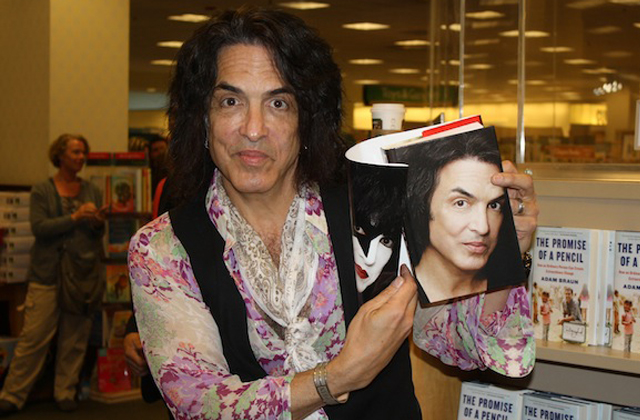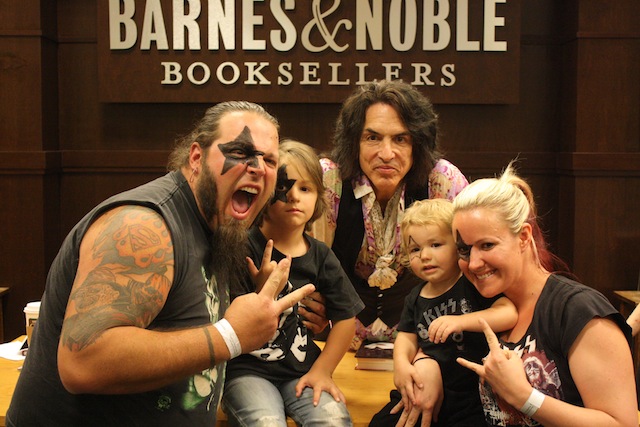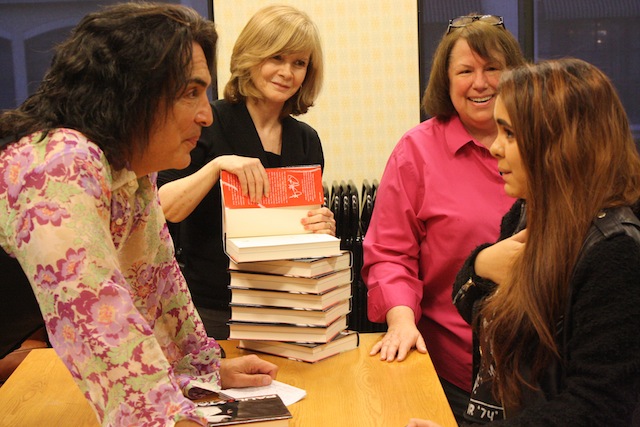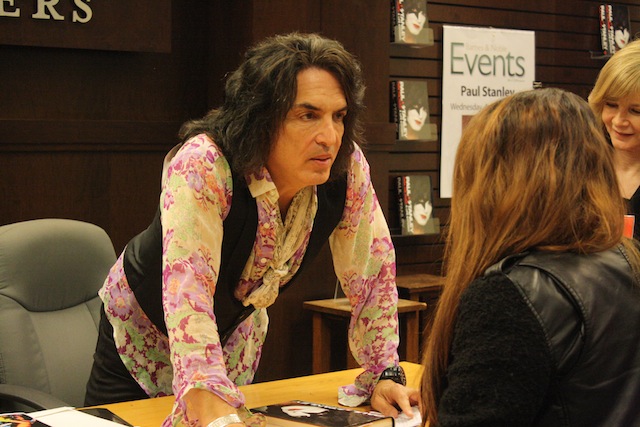Press
Paul’s Interview with Ultimate Classic Rock

Paul Stanley on His Childhood: ‘I Was Simply Determined to Find My Way Out’
by Chris Epting
Kiss star Paul Stanley’s new memoir, ‘Face the Music: A Life Exposed’ is garnering many rave reviews for its raw and open honesty, along with the many life lessons that the Starchild has amassed over the years. Revealing in great detail a wildly dysfunctional childhood made harder by an ear deformation, Stanley’s straightforward storytelling is electrifying.
We had a chance to sit down with Stanley and talk about the book just before he warmly and generously greeted and posed for photos with a crowd of over 500 at a Los Angeles bookstore.
Paul, there are a lot of surprising moments in your new book. One that really jumps out is the scene just after Kiss played Madison Square Garden in late 1977. You describe how the other guys in the band were off with friends and family while you found yourself alone in a deli on Third Avenue eating matzo ball soup. What an unexpected picture.
Right? I think it’s healthy for people to get a reality check on what it’s like sometimes. I think moments like that can help us stop deifying people and putting them on pedestals. A lot of times in this book I think people will relate to the fact that they’re not much different than I am. This idea of helping to inspire people by letting me know what my life was like is a gift to me. You get the most out of life when you give the most. I didn’t realize that as a kid but I certainly learned it as I got older.
Many of us are familiar with how hard Kiss has always worked, especially back in the beginning. But what you experienced during your childhood may be startling to readers. There was a lot of dysfunction in your household growing up.
I don’t know what I’m made out of. But it’s pretty strong. I’m not somebody who folds and I’m not somebody who surrenders I’m not somebody who gives in. I was simply determined to find my way out. I just didn’t know what was going to take. You can paraphrase Bob Dylan. Dylan said in one of his songs, “You know what you want but I know what you need.” And in life, we chase what we want. We don’t always chase what we need. And to reach a point where you understand what life is really about is freeing and liberating. You only get to that point by opening up. That’s what I did in this book. If you shut down all the time you get nothing.
The details in the book, especially from the early days, are quite vivid. Did you ever keep a diary over the years?
I never kept a diary. I’m just really detail oriented and I don’t forget. I think most of us remember moments in our lives that are pivotal. Most of us remember things that hurt us when we were kids because there is still a kid inside of us. So I didn’t find it difficult to recall anything because one memory led to another. And then somebody says to me, was it cathartic to write this book? And I say, no, my life was cathartic! This was easy. This was just retelling the story (laughs). I really hoped this book would be received the way it is being received. But many times we hope for all kinds of things. That said, I really thought it was a story worth telling and could be told in a way that would resonate with people. The amount of people saying that it’s inspiring to them and that they see themselves in the book, that’s great. I mean, we all have secrets and we start telling them and then we find out that a lot of people also have the same secrets.
As much as anything else in the book, New York City plays a huge part in your story.
I’m very much a product of New York. The fact that there were so many concerts that I could go to all the time, virtually every weekend, was just amazing. And the beauty of the concerts I saw in New York was that the bills were always very eclectic. Music needs variety. What I miss now is that diversity that we used to have. When you could go to a concert and see Led Zeppelin with Woody Herman’s Orchestra opening up, that was amazing. Or Buddy Guy opening for the Who. Traffic, Blue Cheer and Iron Butterfly. Just these unbelievably eclectic events. People were much more accepting of that kind of diversity. And New York was just abuzz with that kind of stuff. I saw the Yardbirds with Jimmy Page and Vanilla Fudge opening up. It was beautiful. New York was just a wonderful scene.
Like many other musicians, you talk about the impact the Beatles had on you after you saw them on television. For a lot of musicians that grew up in the ’70s, they point to their first Kiss experience as being a huge inspiration. Do many bands share that with you?
Sure, I hear from them. But I can’t compare us to the Beatles. I don’t think we can shine their shoes.
Well, not to directly compare. The point being, every generation has bands that are really influential, and there’s no getting around how influential Kiss has been.
Right. But the beauty of being inspired by somebody doesn’t mean that you go copy them. It means that they breathe life into you. If you are inspired by Picasso, it doesn’t mean that you have to go paint two eyes on one side of the head. It just touches an emotional chord in you. That’s what the Beatles did to me. It was an epiphany. It made me think, I can do that. I can play guitar. I wasn’t a very popular kid but something inside told me I could do that. The interesting thing for me is that some people see what we do in Kiss as being trite. Self empowerment and singing about celebrating life and the can-do kind of attitude is timeless. You can’t save the whales and you can’t take care of the ozone layer unless you believe in yourself. So it precludes all of those other things. All of those things that some critics think are deep and pivotal in the world are all based on what we were singing about first. So, the chicken or the egg? I say, Kiss.
In the book you really put people inside the New York City loft, that room that became kind of like ground zero for Kiss. Have you been back to visit that space since then?
I did! I went back to the building and went up there but it has a different life. I guess it’s like going back to the room you grew up in when somebody else lives there and it’s owned by different family. You can’t take away what happened in there. But it just feels different today. Looking back at these things is really interesting for me. It’s all kind of magical. I was talking to my son tonight and I said to him, my life is more full and rich and full of wonderment right now that it has been at any point in my life. And that’s what we should all hope for. So I look back on those days like being up in the loft and they were certainly magical but also sometimes painful.
What does your family think of the book?
Well my dad read it and it’s very hard for him. But it was essential for me to tell the truth. That doesn’t mean you have to be malicious or that you have to look for any kind of revenge. My parents didn’t do what they did to be mean. And for me to tell a story that would resonate with people, it had to be truthful. But my dad is 94 now and that to me is a blessing in itself. The real motive for me doing the book was for my kids. I didn’t want to be tawdry and didn’t want to sensationalize in any way, but rather I wanted to tell my story in a way that my kids could look at and see that life wasn’t always easy and that their dad made this for himself and that maybe can learn from that and go out there and build their own lives.
You also go into great detail about the people who helped develop the Kiss concept, people like Sean Delaney. who was instrumental in developing so many parts of the Kiss performance. You spread the credit around a lot, which is not always the case in a rock star memoir.
Hey, there’s room in the spotlight for everybody. If somebody writing a book doesn’t include those that helped them get there, that’s only because they’re threatened by those people. And I’m not. I get joy in knowing that my team did their part. There’s always a team that makes it happen. And they deserve credit. Acknowledging them doesn’t take anything away from me. Actually, it makes you feel good to acknowledge people. I really believe, the kinder are you are, the happier you are. That’s the lesson for people.



Photos by Chris Epting for Ultimate Classic Rock
Original article from Ultimate Classic Rock